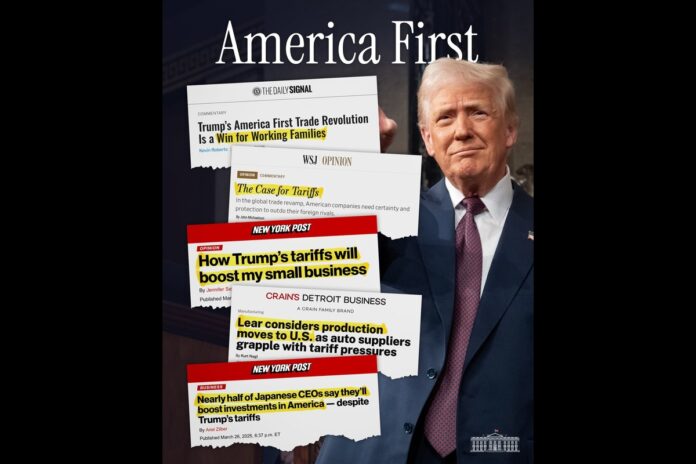China has announced a 34% tariff on imports of US goods, marking a significant escalation in the ongoing trade war.
This move comes in direct retaliation to the Trump administration’s decision to impose tariffs on Chinese imports. Beijing’s response underscores the deepening economic conflict between the world’s two largest economies.
The new tariffs will affect a wide range of American products, including agricultural goods, automobiles, and technology components. US exporters, particularly farmers and automakers, are expected to bear the brunt of the financial burden. Many businesses fear that prolonged tariffs will hurt sales and reduce their competitive edge in the global market.
Washington initially imposed tariffs on Chinese imports, citing concerns over unfair trade practices and intellectual property theft. The Trump administration believed that tariffs would pressure China to change its economic policies. However, China’s swift retaliation signals its unwillingness to back down without a fight.
This latest move by Beijing is part of a broader strategy to counterbalance the impact of US tariffs. By targeting key American industries, China aims to create economic pressure that could force the US to reconsider its stance. Many analysts argue that both economies stand to lose if the trade war continues unchecked.
US farmers have been among the hardest hit by China’s tariffs, particularly soybean growers who rely heavily on Chinese buyers. With the increased tariffs, American agricultural exports may struggle to compete with alternative suppliers. Consequently, many farmers face financial uncertainty and potential job losses.
Similarly, the US automobile industry is experiencing growing concerns about declining exports to China. Major automakers fear that reduced demand from Chinese consumers will lead to production slowdowns. A prolonged trade war could ultimately lead to job cuts and further economic disruptions in the sector.
China’s tariffs also impact the technology industry, with companies facing higher costs for components exported to China. Increased tariffs could slow innovation and reduce investment in research and development. If businesses pass these costs onto consumers, it may lead to higher prices for technology products worldwide.
Beyond economic implications, the trade war is also straining diplomatic relations between the US and China. The growing tension has raised concerns about long-term political and economic stability. Some experts worry that continued hostilities could spill over into other areas, including security and foreign policy.
Despite the escalating trade conflict, some business leaders and economists remain hopeful for negotiations. There is speculation that both sides may seek a compromise to avoid further economic damage. However, with neither country willing to show weakness, the road to resolution remains uncertain.
While China’s latest tariffs are a direct response to Trump’s policies, they also reflect Beijing’s broader economic strategy. By asserting its position in the global economy, China aims to demonstrate resilience against external pressure. This approach highlights the country’s commitment to defending its economic interests.
Some analysts argue that Trump’s aggressive trade policies could backfire by weakening US economic growth. If businesses face higher costs and reduced market access, long-term economic expansion may slow. In contrast, China may seek alternative trade partnerships to minimize reliance on US imports.
The trade war has already disrupted global supply chains, affecting businesses and consumers worldwide. Higher tariffs lead to increased production costs, which may ultimately translate to higher prices. As both nations continue their standoff, companies are exploring new strategies to mitigate financial losses.
Consumer prices could rise as companies pass additional costs onto buyers. This scenario may particularly affect industries that depend on imported materials. If the trade war persists, inflationary pressures may lead to reduced purchasing power for consumers in both countries.
International organizations, including the World Trade Organization (WTO), have voiced concerns about the prolonged economic conflict. Some experts argue that trade wars ultimately hurt global economic stability. Calls for renewed negotiations are growing as businesses and governments seek solutions.
Other countries are also closely watching the US-China trade war, as its outcome may set a precedent for global trade relations. Nations that rely on exports to both economies may experience collateral economic damage. Consequently, global markets remain volatile as uncertainty looms over future trade policies.
Some economists believe that mutual concessions could help de-escalate tensions and restore normal trade relations. Possible solutions include reducing tariffs and creating new trade agreements. However, finding common ground remains challenging given the deep-rooted economic and political differences between the two nations.
As the trade war drags on, small businesses in both countries are feeling the impact. Many entrepreneurs rely on stable trade relations to sustain operations and growth. If tariffs persist, small businesses may struggle to compete, leading to job losses and reduced economic opportunities.
Despite ongoing tensions, there is still room for diplomacy and compromise. Some US lawmakers and business leaders advocate for renewed trade talks to prevent further damage. Whether these efforts will lead to a resolution remains uncertain, but many hope for a de-escalation of hostilities.
The global economy depends on stable trade relations between major economic powers like the US and China. A prolonged trade war could have lasting effects on international markets. For now, businesses, policymakers, and consumers alike are watching closely, hoping for a resolution to the standoff.
In the coming months, both nations face critical decisions that will shape the future of US-China trade relations. The stakes remain high, and the world awaits the next move in this unfolding economic battle. Whether a compromise is reached or tensions continue to rise, the outcome will have far-reaching consequences.


